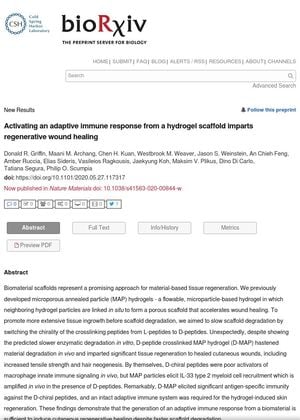Activating an Adaptive Immune Response from a Hydrogel Scaffold Imparts Regenerative Wound Healing
May 2020
in “
bioRxiv (Cold Spring Harbor Laboratory)
”

TLDR A special gel scaffold was made that speeds up wound healing and skin regeneration, even though it breaks down faster than expected.
In 2020, researchers developed a biomaterial scaffold, specifically microporous annealed particle (MAP) hydrogels, to accelerate wound healing. They attempted to slow scaffold degradation by switching the crosslinking peptides from L-peptides to D-peptides. Contrary to expectations, D-peptide crosslinked MAP hydrogel (D-MAP) sped up material degradation in vivo but significantly improved tissue regeneration in healed cutaneous wounds, including increased tensile strength and hair neogenesis. D-MAP also elicited a significant antigen-specific immunity against the D-chiral peptides, and an intact adaptive immune system was necessary for the hydrogel-induced skin regeneration. This study demonstrated that generating an adaptive immune response from a biomaterial can induce cutaneous regenerative healing despite faster scaffold degradation.







